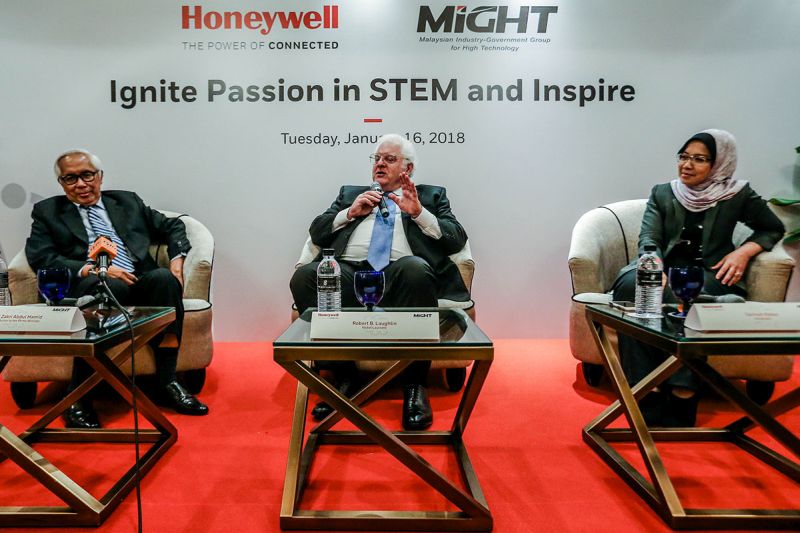KUALA LUMPUR, Jan 16 — Malaysia has successfully developed science, technology, engineering and mathematics (STEM) industries, a scientific advisor to the Prime Minister said today.
Speaking during the Honeywell Initiative for Science and Engineering panel session at the Ritz-Carlton here, Tan Sri Zakri Abd Hamid said it was a misconception that STEM investments had to be "big dollar" projects.
"Malaysia had made strides in STEM industries, especially in the electronics manufacturing and oil and gas industries. If you look at Malaysia’s STEM investments, we have been quite good. It is a misconception that STEM has to be a heavy investment.
"We have even gone further in preparing the country for the Fourth Industrial Revolution as we seek to move away from industries depending on cheap labour and into high technology investments in aerospace, railways and shipbuilding," he said.
Industry 4.0 or the Fourth Industrial Revolution refers to the current trend of automation and data exchange in manufacturing technologies. It includes cyber-physical systems, the Internet of things, cloud computing and cognitive computing.
Zakri also said the government had recognised the need to respond to new challenges, such as climate change, in moving towards sustainable technology and energy.
“Industries relying on cheap labour will be phased out and this was a key factor in emphasising stem and encouraging involvement in it.”
He also said the country had invested heavily in developing STEM subjects at the educational level with the end goal of achieving a 60 to 40 ratio of science students versus arts students.
"We have done our best to emphasise the importance of the sciences, both in our industrial and economic activity but also in the development of our human resources," he said.
"But there is only so much government initiatives can do...parents and educators need to follow through in helping generate interest for STEM and so bring up the next generation of scientists and tech developers."
Also present at the panel session were Nobel Prize winner for Physics Prof Robert B. Laughlin and Honeywell Human Resources for Asia Pacific vice-president Sarinah Bakar, who shared their views with educators and industry representatives.
On the issue of what industries in the tech sector were suited for government investment, Laughlin said several countries, including his own and others in Asia, had grappled with the best options.
“High levels of the government in many countries have thought it through. Singapore for example makes money in oil, and is now investing that money in biotechnology and medical equipment,” he said.
“They based this off a formula on what would be best for their country. They looked at which industries were growing and found that medical instruments were outperforming other industries and that determined the direction of their STEM investments.
“But every country is different. In the [United] States, the private economy is so powerful that government policy has difficulty in keeping up, they innovate around existing government policy. But Malaysia will have to seek what is best for it,” he added.
Laughlin also said there needed to be a greater emphasis on developing technologies that would help create a sustainable future and that the scientific community had many aspects to explore on the issue.
“At present, alternative energy sources can in no way rival fossil fuel. A big factor is reliability as wind and solar energy is dependent on environmental factors and there is no cheap or effective solution to storing the energy harvested.”
Laughin, who is set to speak to students at Universiti Teknologi Petronas on January 18, has himself been engaged in research on a new and efficient means of storing such energy called the “Brayton Battery”.
The system functions as a “refrigerator” cooling energy in the form of heat which could be rekindled to generate electricity, and is meant to make alternative energy commercially competitive with traditional sources.
Sarinah said non-governmental actors, especially industry players and the private sector, needed to better engage students and could play a bigger role in the development of local talents.
“If you look at what the country or government can do to prepare students is secondary. It is more important to provide opportunities especially in research. We cannot depend on schools and universities to prepare students.
“There has to be greater industry involvement in the development of STEM. They have to reach out to talented graduates, provide them with the necessary resources, use their core knowledge gained through the academic system and give them real world opportunities in developing their skills,” she said.



















